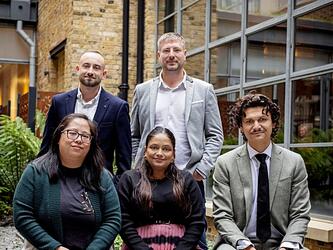It takes a village to care for a patient
Patient-centricity has transformed the pharmaceutical industry in recent years, and with this market research has played a pivotal role as companies need to have a deeper understanding of patient experiences.
Alongside this, understanding the caregiver perspective has gained significance: they are often on the journey with the patient, learning about the condition, impacted by it and even managing the condition. But how often do we focus on the rest of the family and the role they play?
As researchers, we may pick this up anecdotally through talking to the patient and carer, e.g., a mention of older patients who take their adult children to consultations to interpret and provide support. The wider family network coming into play as nieces, nephews and cousins take it in turn to administer an elderly patient’s injectable treatment, or the teenage son who takes responsibility to organise his father’s multiple daily pills.
Traditional research therefore catches a glimpse of this support network, but not the necessary nuances that will deliver new, in-depth actionable insights and better patient outcomes. To do this, multi-generational research is clearly the next step in the evolution of patient research.
To incorporate this wider perspective, we have 5 simple rules to help you plan your multi generation research:
- Be flexible
Talking to multiple members of the family needs careful planning yet a degree of flexibility. These people have busy lives. Plan your methodology to cater to their busy schedules and level of willingness:
- Make your in-home immersions longer so you are there across the afternoon and the evening
- Consider mixed methodologies, offering either a face to face or a telephone interview
- Create online communities with a space for each member of the family to contribute
- Make sure your fieldwork timings accommodate availabilities of all family members.
- Be iterative
Don’t assume the roles and experiences of the different family members before the start of research; use the initial stages of the research to discover who and how you need to talk to each member of the family:
- Set up longer 1:1s with the patient and their caregiver
- Followed by shorter more focused interviews with other family members deep diving into specific aspects highlighted in the previous interviews.
- Be considerate
Patient research by its very nature is sensitive and therapeutic, it’s important to allow each family member the space and opportunity to talk privately:
- During in home immersions if you are having a group family discussion, follow up with individual interviews even if it’s only 15 minutes
- Online communities that allow you to set tasks allowing the family group to interact and also have a private anonymous space to vent and express.
- Be focused
One of the most rewarding aspects of patient research is that you learn and discover so much about the lives of the patients and their families – but it is also very easy to get side-tracked.
- Create a simple objective checklist to continually refer to as you design and iterate your methodology
- In multi country studies – set up regular catch ups with your moderators to plan and shape the evolving methodology and maintain consistency.
- Be action orientated
Be clear before you design your methodology about what the outputs from this research are intended to incite:
- Will the outputs feed into educational guides, support tools, communication materials created?
- Who will be using the outputs, sales, marketing, R&D teams?
- Do you need to create videos, info graphics, lexicon analysis?
The very nature of patient research is that it is complex. From the practical experiences to the emotional ups and downs to the challenges faced. By adding a multi-generational lens to this work, the lid can be lifted on what really drives the patient experience and outcomes.
Dinisha Cherodian is an associate at Incite

We hope you enjoyed this article.
Research Live is published by MRS.
The Market Research Society (MRS) exists to promote and protect the research sector, showcasing how research delivers impact for businesses and government.
Members of MRS enjoy many benefits including tailoured policy guidance, discounts on training and conferences, and access to member-only content.
For example, there's an archive of winning case studies from over a decade of MRS Awards.
Find out more about the benefits of joining MRS here.














0 Comments